
Hiram Warren Johnson was an American attorney and politician who served as the 23rd governor of California from 1911 to 1917 and represented California in the U.S. Senate for five terms from 1917 to 1945. Johnson achieved national prominence in the early 20th century as a leading progressive and ran for vice president on Theodore Roosevelt's Progressive ticket in the 1912 presidential election. As a U.S. senator, Johnson was a leading critic of the foreign policy of both Woodrow Wilson and Franklin D. Roosevelt.
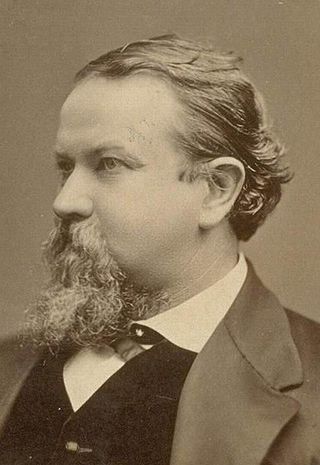
Milton Slocum Latham was an American politician, who served as the sixth governor of California and as a U.S. Representative and U.S. Senator. Latham holds the distinction of having the shortest governorship in California history, lasting for five days between January 9 and January 14, 1860. A Lecompton Democrat, Latham resigned from office after being elected by the state legislature to a seat in the U.S. Senate.

George Hearst was an American businessman, politician, and patriarch of the Hearst business dynasty. After growing up on a small farm in Missouri, he founded many mining operations, and is known for developing and expanding the Homestake Mine in the late 1870s in the Black Hills of South Dakota. In 1879, he listed it on the New York Stock Exchange and went on to other pursuits. The mine's gold production continued uninterrupted until 2001.
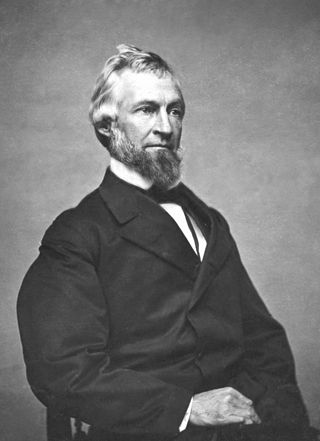
James Alexander McDougall was an American attorney and politician elected to statewide office in two U.S. states, then to the United States House of Representatives and United States Senate. A gifted orator, McDougall began his career as a civil engineer in New York, then read law, rising quickly to heights in his profession in Illinois, where he became a friend of fellow Illinois attorneys Abraham Lincoln, Edward D. Baker, and Stephen Douglas. Like many Americans, McDougall was drawn to Gold Rush California in 1849; he resumed his law practice and was elected second attorney general for the new state of California. In the election of 1860, Lincoln won the presidency as a Republican, Baker was elected Republican senator from Oregon, and McDougall was elected senator from California, joining Douglas in the Senate as fellow War Democrats. All three of McDougall's Illinois friends would die in the six years before his term as senator expired. A noted drinker, McDougall once gave an address to the Senate disparaging a proposed rule to outlaw the sale of alcohol in the United States Capitol, but died shortly after leaving the Senate, "...hastened by his indulgence in the bowl."

Aaron Augustus Sargent was an American journalist, lawyer, politician and diplomat. In 1878, Sargent historically introduced what would later become the 19th Amendment to the U.S. Constitution, giving women the right to vote. He was sometimes called the "Senator for the Southern Pacific Railroad".
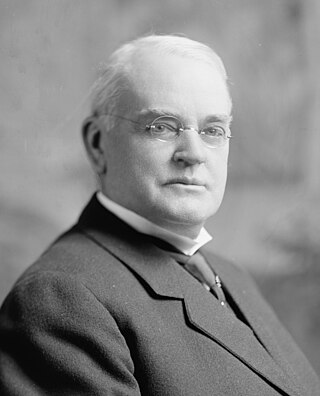
John Downey Works was an American politician and lawyer. He was a U.S. Senator representing California from 1911 to 1917, and an associate justice of the California Supreme Court from October 2, 1888, to January 5, 1891.

John Sharpenstein Hager was an American politician from New Jersey who represented the state of California in the U.S. Senate from 1873 to 1875. He was a Democrat.

Stephen Mallory White was an American attorney and politician from California. A Democrat, he was most notable for his service as a U.S. Senator from 1893 to 1899.

Abram Pease Williams was an American teacher, businessman and politician. He served as a U.S. Senator from California.

Charles Norton Felton was an American banker and politician who served as a Congressman and U.S. Senator from California in the late 19th century, in addition to co-founding the progenitor of the Chevron Corporation.
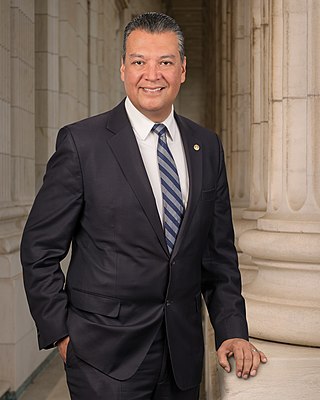
Alejandro "Alex" Padilla is an American politician serving as the senior United States senator from California, a seat he has held since 2021. A member of the Democratic Party, Padilla served as the 30th secretary of state of California from 2015 to 2021 and was a member of the California State Senate and the Los Angeles City Council.

William Thompson Wallace was the 12th Chief Justice of California and the 6th Attorney General of California. He served on the Supreme Court of California from 1871 to 1879 and as Attorney General from 1856 to 1858.

Kamala Devi Harris is an American politician and attorney who has been the 49th and current vice president of the United States since 2021, serving under President Joe Biden. Harris is the Democratic Party's nominee for president in the 2024 election. She is the first woman, the first African American, and the first Asian American to be vice president, due to her Afro-Jamaican and Indian American descent. She is the highest-ranking female official in U.S. history. From 2017 to 2021, she represented California in the United States Senate. Before that, she was the attorney general of California.
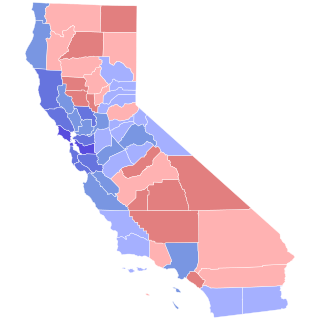
The 1992 United States Senate special election in California took place on November 3, 1992, at the same time as the regular election to the United States Senate in California. Feinstein defeated future California governor Gray Davis in the Democratic primary, while Seymour defeated William E. Dannemeyer in the Republican primary.

The 1886–87 United States Senate elections were held on various dates in various states. As these U.S. Senate elections were prior to the ratification of the Seventeenth Amendment in 1913, senators were chosen by state legislatures. Senators were elected over a wide range of time throughout 1886 and 1887, and a seat may have been filled months late or remained vacant due to legislative deadlock. In these elections, terms were up for the senators in Class 1.

The 2016 United States Senate election in California was held on November 8, 2016, to elect a member of the United States Senate to represent the State of California, concurrently with the 2016 U.S. presidential election, as well as elections to the United States Senate in other states and elections to the United States House of Representatives and various state and local elections.

The 2018 United States Senate election in California took place on November 6, 2018, to elect a member of the United States Senate to represent California, concurrently with other elections to the United States Senate, elections to the United States House of Representatives, and various state and local elections.

Two 2022 United States Senate elections in California were held concurrently on November 8, 2022, to elect a member of the United States Senate to represent the State of California. There were two ballot items for the same Class 3 seat: a special election to fill the seat for the final weeks of the 117th United States Congress, and a general election for a full term, starting in the 118th United States Congress.

The 1964 United States Senate election in California was held on November 3, 1964.

The 2020 California State Senate election was held on Tuesday, November 3, 2020, with the primary election scheduled for March 3, 2020. Voters in the 20 odd-numbered districts of the California State Senate elected their representatives. The elections coincided with the elections for other offices, including for U.S. President and the state assembly.






















